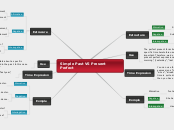Simple Past VS Present Perfect
Estructure
Afirmative
Subject + Auxiliary + Verb in the past participle
Negative
Subject + verb auxiliary + past participle
Interrogative
Verb auxiliary + subject + past participle
Use
The perfect present for actions that occurred in a non-specific time heretofore used. The specific time is not important. Therefore, we do not usually use with the present perfect expressions of specific time ("this morning", "yesterday", "last year" ...).
Time Expresion
You can use the present perfect with no specific time expressions ("never", "ever", "many times", "for", "since", "already", "yet" ...). This concept of no specific time is quite difficult to understand, for this reason, then you have particular uses of the present perfect.
Exmple
Afirmative
I've talked to Peter. (He hablado con Peter.)
Negative
She hasn't gone to work. (No ha ido a su trabajo.)
Interrogative
Have you talked to Peter? (¿Has hablado con Peter?)
Estrucure
Afirmative
Subject+ Verb in past + complement
Pronoun +Wasn't/Weren't +complement
Negative
Pronoun +Didn't +Verb + complement
Subtema
Pronoun+Wasn't/Weren't+complement
Interrogative
did + subject + verb in present + complement + ?
WAS/WERE+pronoun+complement+?
Use
The simple past is used to talk about a specific action that began and ended in the past. In this case equals the Spanish preterite.
Time Expresion
Generally, we use with adverbs of time as "last year", "yesterday", "last night" ...
Exmple
Afirmative
She was a doctor.
Negative
She wasn't a doctor.
I didn't want to dance.
Interrogative
Was she a doctor?
Did you want to dance?
